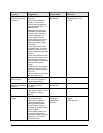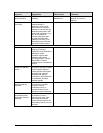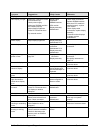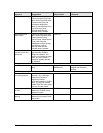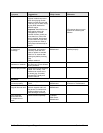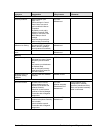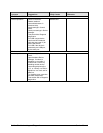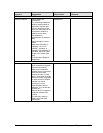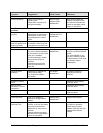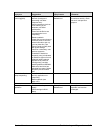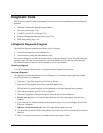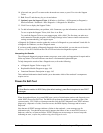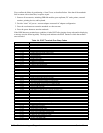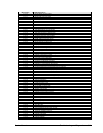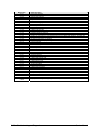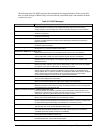
Symptom
Call Center:
Suggestions
Repair Center:
Likely Causes
Repair Center:
Comments
Wireless
Mini-PCI card.
Make sure all cables are
properly connected to mini-
PCI card and motherboard.
Check for damaged coaxial
cables or connectors.
General problems. Check TCP/IP setup in
Control Panel.
Antenna PCAs.
Check SSID, channel, and
encryption settings.
Motherboard.
One-Touch button
problems
Keyboard cover.
Buttons not working
properly.
Make sure correct
applications are associated
with buttons in One-Touch
tab of Keyboard in Control
Panel.
Switchboard PCA.
Motherboard.
Make sure Onscreen Display
is enabled in One-Touch tab
of Keyboard in Control Panel.
On-screen display
does not appear when
button is pressed.
PCMCIA
PCMCIA socket. Using a flashlight, look for
bent pins inside the PCMCIA
socket.
General problems. Restart notebook.
Motherboard.
Try card in another computer.
If card requires an IRQ, make
sure one is available.
For model XE4500, if only
one slot is affected, replace
PCMCIA socket. If both slots
are affected, replace
motherboard.
In Device Manager, refresh
device list and check for
conflicts.
Download current drivers
from card manufacturer’s
Web site.
AC adapter
AC adapter. AC adapter cannot be
repaired and must be
replaced.
Does not power
notebook.
Make sure AC adapter has
correct power rating.
Motherboard.
Try another AC adapter,
if available.
Motherboard
Evidence of spilled
liquid.
Declared to be caused by
customer abuse.
Bent or broken
connectors, or burnt
component.
Declared to be caused by
customer abuse.
Motherboard cracked. Declared to be caused by
customer abuse.
Miscellaneous
Clock loses time Plug in AC adapter for
24 hours to charge CMOS
battery.
CMOS battery.
Motherboard.
Charge CMOS battery.
Notebook gets
abnormally hot.
Always set notebook on a flat
surface, so air can flow freely
around and underneath it
Make sure air vents are not
blocked.
Games and other programs
that drive CPU usage toward
100% can contribute.
Heat sink. Check heat sink for damage
or proper fan operation.
Check thermal contact
between CPU and heat sink.
Replace thermal pad if
needed.
3-16 Troubleshooting and Diagnostics Service Manual



